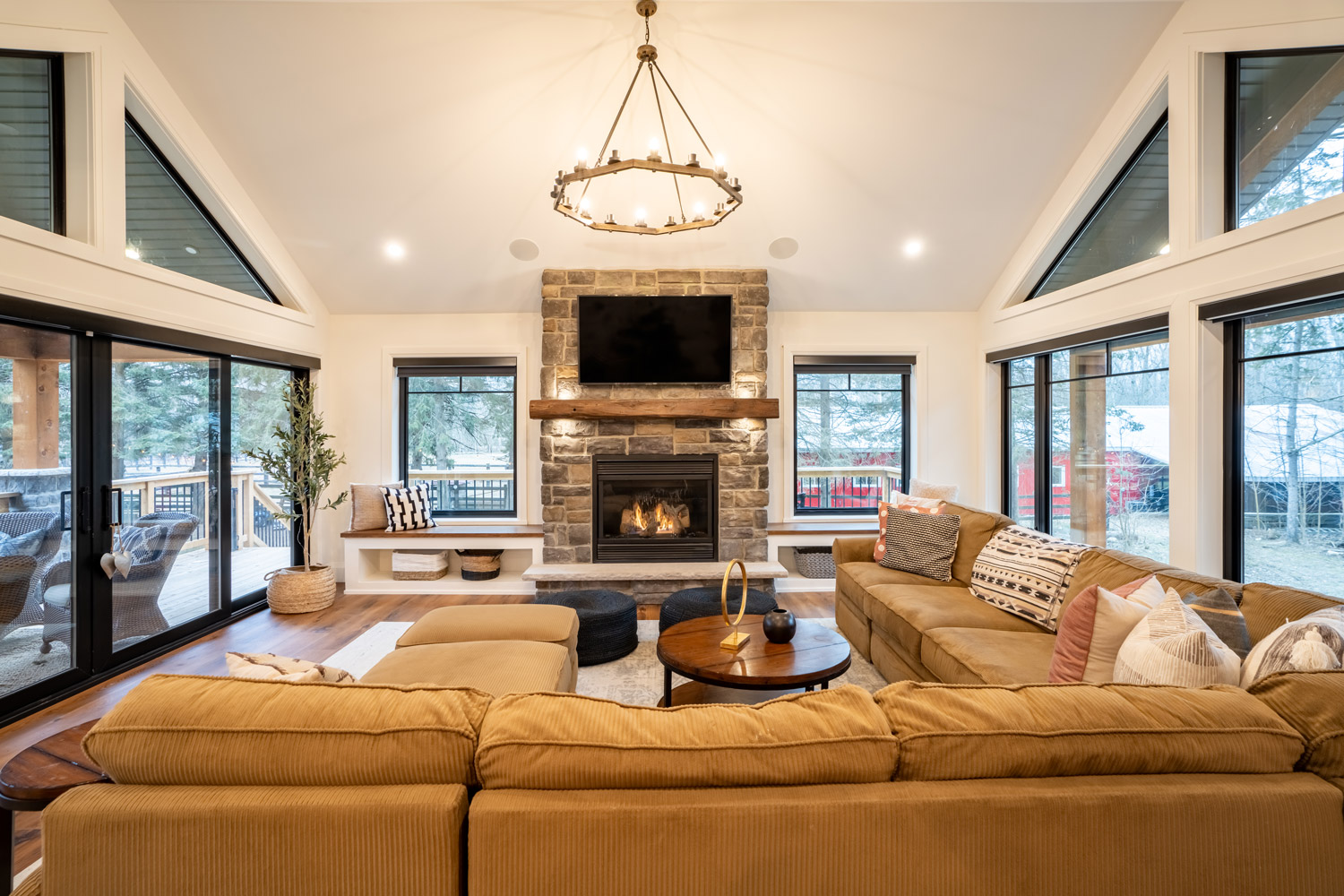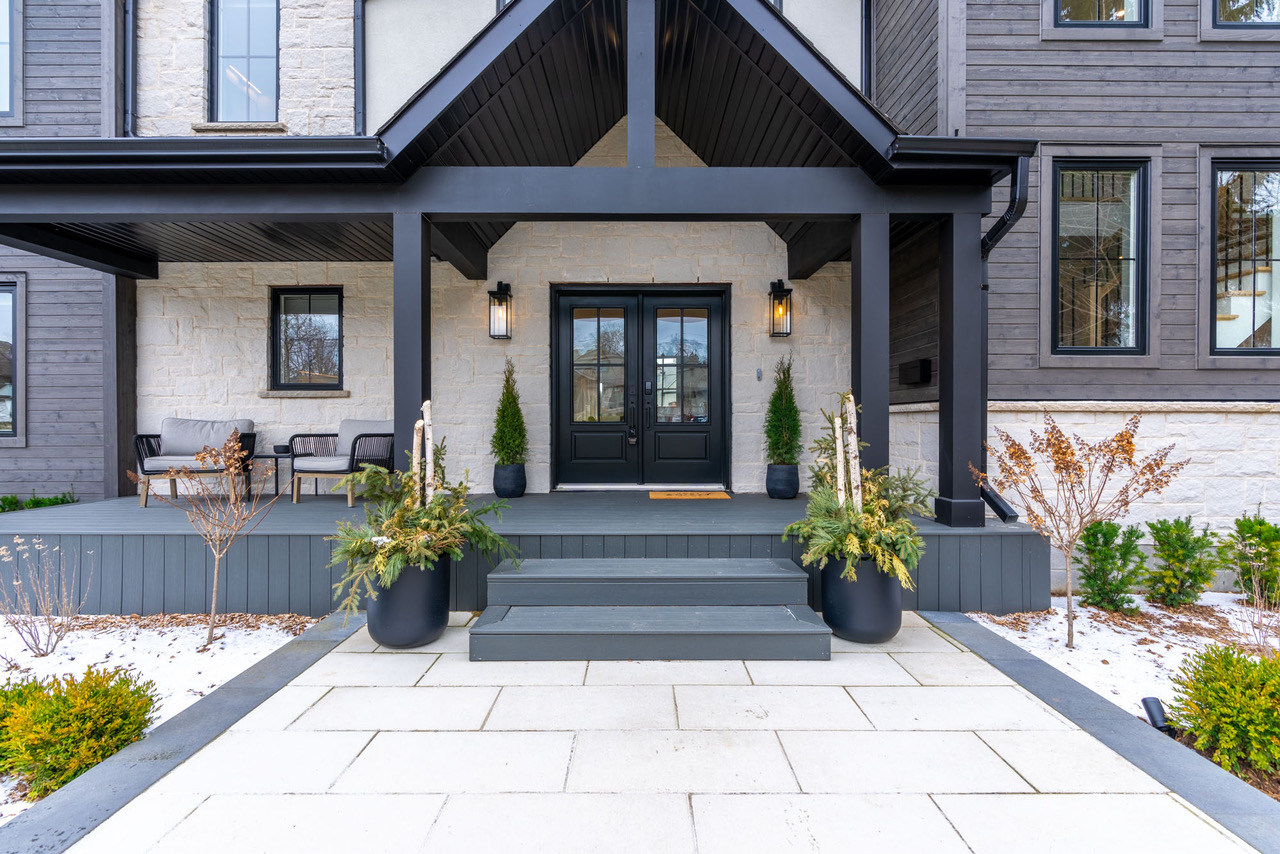
Toronto’s Leading Custom Home Builders: Who to Trust in 2025
Building a custom home in Toronto is one of the biggest creative decisions you will ever make.
Your builder will translate sketches and ideas into a structure that must satisfy local bylaws, protect your investment, and fit your family’s lifestyle for decades. Finding that ideal partner calls for more than checking a few references; it demands clear insight into value, craftsmanship, and communication. The guidance below equips you with the detail you need to choose well. Construction costs, permit timelines, and design choices all shift from street to street across Toronto, Oakville, and Burlington, yet the most reliable builders share proven habits. They listen first, explain options plainly, and document every promise in writing so you can track progress without stress. They handle trades scheduling, safety oversight, and quality control while respecting your budget and schedule. Knowing what top‑tier builders actually deliver will give you confidence as you step into planning.
What Custom Home Builders In Toronto Really Offer Clients
A reputable custom home builder provides far more than labour and materials. They act as a single point of responsibility, coordinating architects, structural engineers, and trades so every stage lines up without costly surprises. Experienced teams know city zoning rules intimately and prepare drawings that win permit approval the first time, sparing weeks of delays. They also maintain strong supplier relationships, securing high‑quality lumber, mechanical systems, and finishes at fair prices even in tight markets. Finally, they protect your investment with detailed contracts, transparent cost reports, and warranty coverage that remains in force long after move‑in.
Skilled project managers hold weekly site meetings, share progress photos, and log every site inspection in a shared client portal. This consistent flow of information gives you the clarity to make timely selections on fixtures, cabinetry, and flooring. The best custom home builders Toronto residents recommend also offer energy modelling and insulation upgrades that cut utility costs without compromising style. Their crews keep work sites tidy, reducing waste and minimizing disruption to neighbours. Strong insurance coverage and strict safety standards round out a professional package that shields you from liability.
Remember that stellar builders focus on service as much as structure. They respect your vision, suggest thoughtful improvements, and remain calm when unexpected site conditions pop up. Their trade partners share that attitude, creating a workplace culture of courtesy that neighbours and inspectors notice. When you blend fine craftsmanship with respectful collaboration, your new home stands as proof of quality that lasts.
How To Compare Custom Home Builders Toronto Clients Can Trust
Selecting the right professional starts with assessing experience, process, and character instead of flashy renderings. Pricing matters, yet hidden fees and rushed schedules often cost more over time than a slightly higher upfront quote. A careful comparison brings those buried differences to light. Use the points below as your measuring stick when interviewing firms.
- Track record in similar neighbourhoods: Ask for addresses of recently finished homes within your zoning district and speak with owners about schedule accuracy and workmanship. Confirm that the builder passed every municipal inspection on the first visit.
- Dedicated project manager assignment: Find out who will answer your calls daily and how many projects that person currently handles; overloaded managers miss details. Look for a workload that allows prompt site supervision.
- Transparent cost‑plus or fixed‑fee contract options: Well‑run firms spell out allowances, change‑order margins, and payment triggers in plain language. This clarity prevents disputes once framing starts.
- Licensed and insured trade network: Verify current WSIB coverage and liability insurance for every subcontractor before signing. Proper documentation protects you if accidents occur on site.
- Digital progress reporting tools: Online schedules, budget dashboards, and photo logs reduce surprises and save countless site visits. Real‑time updates keep everyone aligned without extra meetings.
- Warranty and after‑care commitment: Leading builders remain available for touch‑ups and system checks during the settling year. A clear service calendar preserves finishes and equipment warranties.
Evaluating builders through these lenses clarifies who will respect your time, wallet, and vision. A firm that excels across every point positions your project for steady momentum and peace of mind. The scrutiny may feel intense, yet selecting on quality instead of price alone avoids expensive course corrections later. Choose the partner who welcomes tough questions and answers with documented proof.
Questions Homeowners Should Ask A Custom Home Contractor In Toronto
Strong communication from the first meeting sets the tone for the entire build. Specific questions cut through rehearsed sales pitches and reveal how a contractor plans, prices, and solves problems. Each answer should connect to documented procedures rather than vague assurances. Bring these inquiries to every interview and listen closely to the details.
- What is your average cost per square foot for a similar custom home Toronto clients recently completed, excluding land? A clear figure accompanied by a sample budget shows honesty and market insight.
- How do you structure progress draws, and who verifies completed work before funds release? This illustrates financial discipline and third‑party oversight.
- Which building envelope upgrades do you recommend for Toronto’s climate, and why? Thoughtful suggestions demonstrate technical knowledge and concern for long‑term performance.
- How many active builds are you managing this season, and how do you schedule trades to avoid overlap? Capacity planning directly impacts timeline reliability.
- Can you outline your process for handling change requests after framing? A written policy prevents frustration when design tweaks arise.
- What contingency percentage do you advise clients to hold, and how do you report unexpected costs? Transparent cost tracking preserves trust when surprises surface.
- Who handles municipal inspections and deficiency corrections, and how quickly are issues resolved? Proactive management keeps momentum steady.
These questions give you a window into a contractor’s honesty, systems, and adaptability. Answers backed by documents and references signal a well‑run operation that values accountability. Contractors who hesitate or speak vaguely will likely falter under pressure. Prioritizing clarity upfront saves time, money, and stress during construction.
The Custom Home Toronto Planning Process Explained Clearly
A seamless build starts long before ground breaks. Careful planning aligns zoning rules, design aspirations, and financial realities so construction flows without major pauses. The planning stages below outline how respected builders guide you from concept sketches to shovels in the ground. Understanding each step empowers you to approve decisions with confidence.
Setting Your Vision And Budget Early
Clear goals shrink the gap between concept and final inspection. Begin with room counts, preferred square footage, and must‑have features such as multi‑generational suites or accessibility upgrades. Pair those wishes with a realistic budget range based on current market costs per square foot. When dreams and dollars match, design revisions drop sharply and timelines hold steady.
Builders then translate your vision into schematic drawings that capture overall size, style, and layout without heavy engineering detail. These early plans allow quick cost feedback so you can adjust scope before investing in full construction drawings. A shared vision statement accompanies the sketches, guiding every later decision. With alignment locked in writing, everyone moves forward knowing what success looks like.
Securing Permits And Municipal Approvals
Toronto’s zoning by‑laws dictate height, setbacks, and floor‑space index. Builders prepare detailed site plans, grading studies, and energy‑efficiency calculations that satisfy city reviewers on the first submission. Early consultation with planning staff uncovers unique site constraints such as heritage guidelines or tree‑protection zones. Clearing these hurdles early avoids demolition pauses and redesign fees.
Permit packs include structural drawings signed by engineers, mechanical layouts for HVAC sizing, and energy‑model reports showing compliance with the Ontario Building Code. A complete, accurate submission wins approval faster and minimizes costly resubmissions. Once stamps arrive, crews schedule excavation without fear of stop‑work orders.
Selecting Materials And Finishes For Longevity
Finishes influence beauty and maintenance costs for decades. Builders present curated options from suppliers who back products with strong warranties. Comparative samples for flooring, siding, roofing, and windows help you weigh texture, durability, and price. Combining local sourcing with modern manufacturing assures consistency and service availability.
Specifications list every item—from helical piles to cabinet pulls—with manufacturer codes and installation notes. This precision eliminates guesswork for trades and cost disputes with suppliers. Scheduled walk‑throughs at framing, rough‑in, and pre‑drywall stages confirm that chosen materials meet expectations before they disappear behind paint.
Maintaining Communication Through Construction
Regular dialogue keeps budgets on track and design intent intact. Weekly site meetings cover progress, upcoming milestones, and any new decisions required. Cloud‑based project management tools host revised drawings, change orders, and inspection reports in one place. Instant access keeps homeowners, architects, and trades aligned.
When unforeseen site conditions appear, such as buried utilities or soil remediation, the team presents options with clear cost and schedule impact. Prompt, documented choices prevent schedule drift. Active collaboration reduces rework, preserves quality, and sustains morale on site.
Each planning phase builds momentum for the next, reducing risk once construction begins. Builders who respect this sequence deliver fewer change orders and tighter schedules. Homeowners who engage fully at every checkpoint enjoy smoother approvals and clearer cost control. Invest time upfront; the reward is a calm, predictable build.
Why Families Choose Luxury Custom Home Builders In Toronto
Toronto families pursuing high‑end builds want craftsmanship that endures and service that anticipates every need. Luxury custom home builders in Toronto provide in‑house design guidance, private supplier showrooms, and dedicated site supervisors who maintain strict quality benchmarks. Their tradespeople specialize in intricate millwork, stone façades, and advanced mechanical systems that reduce energy use while elevating comfort. They coordinate interior designers early, ensuring lighting, built‑ins, and furnishings feel integrated rather than appended.
Financial transparency remains central even at a premium price point. Detailed schedules of value track allowances for appliances, fixtures, and landscaping so you can reallocate funds as priorities shift. Builders schedule supplier visits around your calendar and arrange virtual walk‑throughs when travel keeps you away. Above all, they respect privacy, staging deliveries to avoid clutter and screening trades for professionalism. The finished result reflects meticulous attention to detail at every turn.
What Makes A Toronto Custom Home Project Succeed Or Stall
Success hinges on decisions made long before concrete is poured. Builders can anticipate many obstacles, yet some issues still derail timelines and budgets. Recognizing these factors gives you the leverage to keep projects moving forward. Keep an eye on the following pressure points during planning and construction.
- Thorough site due diligence: Soil tests, utility locates, and tree surveys reveal hidden costs early and prevent design backtracking. Accurate data saves weeks.
- Realistic allowance budgeting: Under‑estimating kitchen or bathroom finishes forces costly upgrades later; align allowances with design goals from day one.
- Timely decision‑making on selections: Delays on tile, lighting, or hardware orders can halt trades and extend carrying costs; set firm deadlines and stick to them.
- Clear change‑order process: Formal documents capture scope shifts, cost impact, and new deadlines, preserving trust and schedule integrity.
- Consistent site supervision: Daily walkthroughs catch framing or rough‑in errors before drywall; rework discovered later takes longer and leaves scars.
- Weather‑ready scheduling: Winter concrete pours or spring rain can upset timelines; contingency days keep momentum steady without compromising quality.
Each success factor rests on proactive planning and transparent communication. Builders who excel here keep projects close to the original budget and timeline. Homeowners who stay engaged avoid unpleasant surprises. Sustained collaboration protects quality and peace of mind.
Where Custom Home Builders In Toronto See Delays And Added Costs
Budget overruns often trace back to incomplete drawings, under‑scoped allowances, and permit revisions. When construction drawings lack structural details, trades spend extra days waiting for clarification, and inspectors may require costly reinforcements. Similarly, choosing finishes above allowance totals pushes budgets past the comfort zone. Early, accurate specifications help avoid those pitfalls.
Permit amendments also create ripple effects. A minor change to a façade or window placement can trigger fresh zoning reviews, adding weeks of idle time. Builders who track municipal requirements closely catch these issues during design and steer clients toward compliant solutions. Finally, supply shortages on specialty items such as European windows or custom metalwork can stall schedules; reputable builders order critical components early and secure storage to keep progress steady.
How Onelife Builds Toronto Custom Homes With Clarity And Care
Onelife Design & Build understands the stakes involved in crafting a home that mirrors your style and supports your family’s future. Our team assigns a dedicated project manager who keeps you informed through a secure portal that tracks permits, budgets, and daily site photos in real time. Transparent contracts outline allowances and contingency funds so you can see exactly where every dollar flows. Close relationships with architects, structural engineers, and trusted trades allow us to coordinate schedules tightly, reducing downtime and preserving quality.
Clear communication continues after handover with a structured after‑care program that schedules touch‑ups, seasonal system checks, and warranty tracking. This ongoing support means you enjoy your new space without worrying about maintenance surprises. Our approach places your vision at the centre of every meeting, sample review, and site decision, ensuring the finished home feels unmistakably yours. Trust, precision, and long‑term partnership define each build we lead across Toronto, Oakville, and Burlington.
Choosing a builder is ultimately a choice about who will protect your time, investment, and peace of mind. Onelife stands ready to guide you through each decision with honesty, skill, and respect. Reach out when you are ready to turn sketches into a home built to last. We look forward to meeting you and hearing about your ideas.
Key Takeaways
- A trustworthy builder offers far more than construction—they manage permits, trade schedules, and ongoing communication.
- Cost clarity comes from realistic allowances, transparent contracts, and frequent updates throughout the project.
- Questions about timelines, warranties, selection processes, and site supervision help reveal builder quality.
- Planning is not just architectural—it includes site studies, budgeting, permit approvals, and supplier coordination.
- Builders with local knowledge, dedicated managers, and documented systems help you avoid delays and unexpected costs.
Common Questions
What should I include in my budget when planning a custom home in Toronto?
Your custom home budget should cover site preparation, permits, professional fees, construction materials, labour, allowances for finishes, and a contingency reserve. Many homeowners underestimate soft costs like design services, soil testing, and municipal fees. Make sure allowances are realistic for the type of finishes you want, as upgrading later can stretch your budget. A reliable builder will help forecast true costs with a transparent process that includes supplier quotes and schedule-of-values reporting. Onelife works closely with homeowners to build clarity into every financial decision from start to finish.
How do I choose the right builder for a luxury custom home in Toronto?
Look for a builder with proven experience in high-performance homes, detailed contract documentation, and clear communication protocols. The best luxury custom home builders in Toronto offer more than quality finishes—they manage timelines, provide site supervision, and deliver end-to-end design-build services. It’s important to review recent work in your area and speak directly with past clients. Builders who handle fewer projects simultaneously typically offer better attention and accountability. Onelife is built on this level of personalized, collaborative service and long-term support.
What permits are required for custom home construction in Toronto?
Building a custom home in Toronto requires a zoning review, building permit, HVAC design approval, and often heritage or forestry reviews depending on the lot. Each step has unique drawings and documentation requirements. Missteps in this process can add weeks to your timeline or require costly redesigns. Builders with strong local knowledge coordinate directly with city officials to streamline approvals and prevent delays. Onelife manages the full permitting process on your behalf, ensuring early preparation avoids future disruption.
How long does it take to build a custom home in Toronto?
The full process typically spans 14 to 24 months, depending on site complexity, design revisions, weather conditions, and permit timelines. Planning, design, and approvals alone can take up to 6 months, with construction itself lasting anywhere from 10 to 16 months. Timeline success often hinges on early decisions, availability of trades, and supplier lead times. Your builder should provide a realistic project calendar and update it regularly. Onelife’s structured project management tools help keep your build predictable and efficient from day one.
Can I stay involved during construction without being on site?
Yes, and staying engaged remotely is key to avoiding delays or missed decisions. Top builders offer online platforms where you can review progress photos, approve selections, and view inspection reports from anywhere. You should expect regular site updates and the ability to speak directly with your project manager. Builders that use digital tools keep you involved without overwhelming your schedule. Onelife’s client portal was designed to give you full visibility and confidence without requiring constant site visits.







